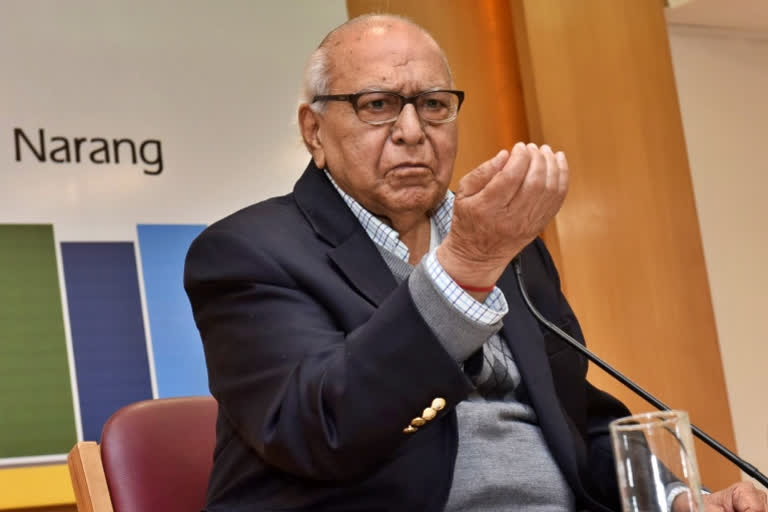New Delhi: Renowned Indian linguist, theorist, literary critic and Urdu scholar Gopi Chand Narang passed away on Wednesday at Charlotte in North Carolina, United States. The ninety-one-year-old scholar died in North Carolina after a brief illness, said his son. He is survived by his wife, Manorma Narang, his sons, Arun Narang and Tarun Narang, and his grandchildren. He was born in 1930 in the small town of Dukki in Baluchistan, located on the border between Pakistan and Afghanistan.
The 91-year-old nonagenarian commanded respect in literary circles. He used to travel all over the world to participate in Urdu meetings and discussions and was fondly called the Ambassador of Urdu. After earning his doctoral degree in Urdu literature from Delhi University in 1958, Professor Narang took an academic position at St. Stephens College in Delhi, which proved to be a segue to a permanent place in the Urdu Department of Delhi University in 1959. He did stints as a visiting scholar in several foreign universities, including Wisconsin University at Madison, Minnesota University in Minneapolis and Oslo University in Norway.
From Delhi University he moved to Jamia Millia Islamia University where he headed the Urdu Department. Professor Narang won many awards and honours, including Padma Bhushan in 2004, Sahitya Akademi and Ghalib Awards in 1995, and the President of Pakistan's Sitara-e Imtiaz Award in 2012. He held the Professor Emeritus position at Jamia Millia and Delhi University.
While he has received the title of Padma Bhushan in India, he has been awarded numerous prizes and awards in Pakistan as well. Until a few months ago, he was the president of Sahitya Akademi, which is dedicated to the promotion of Indian literature in the 24 languages of India. Professor Narang was Vice-chairman of the Delhi Urdu Academy (1996-1999) and the National Council for Promotion of Urdu Language - HRD (1998-2004) and Vice-president (1998-2002) and President (2003-2007) of the Sahitya Akademi.
Also read: Noted Urdu writer Mujtaba Hussain passes away after suffering cardiac arrest
Several Urdu magazines have published the year's special issues to celebrate Professor Narang's life and his contributions to literature. Many leading media organizations, such as Doordarshan and BBC, have produced rare recordings and documentaries on his work and services. Dozens of books and dissertations have been published offering critical appreciation and evaluation of his work.
"Prof. Gopi Chand Narang is a distinguished theorist, literary critic and scholar whose perceptive writings containing the fruits of a focused critical acumen have helped theory-avoidance Urdu criticism in getting itself extricated from the bonds of theme-centred evaluation," the Akademi said in one of its profiles of Narang. Far from treating criticism as a casual activity, Narang has made a seminal contribution in developing an epistemological and theoretical framework of literary evaluation by roping in stylistics, structuralism, post-structuralism and Eastern poetics with remarkable thoroughness and imagination, it added.
Working with Surinder Deol, author and literary translator, Professor Narang published English translations of his major works on Mir Taqi Mir, Ghalib, and Urdu Ghazal in recent years. Distinguished novelist and short story writer Intizar Husain once stated: "When he comes to Pakistan, Professor Gopi Chand Narang represents India in one piece. I can't say this about anyone else. When he occupies the stage, we feel that India in its entirety is addressing us."
Prominent Hindi writer, Kamleshwar, while talking about the critical literary contributions of Professor Narang to the Urdu language, mentioned that every Indian language needs one Gopi Chand Narang. Jnanpeth Awardee fiction writer Qurratulain Hyder described Professor Narang as a "renaissance man" of Urdu.
Poet Gulzar called him "do paaon se chalta dariya, ek paaon pe thehri jhiil, jhiil ki naabhi pe rakhi hai, Urdu ki raushan qindiil" (a river moving on two wheels. A lake balanced on one foot. Settled on the lake's navel Urdu's bright paper lantern).



